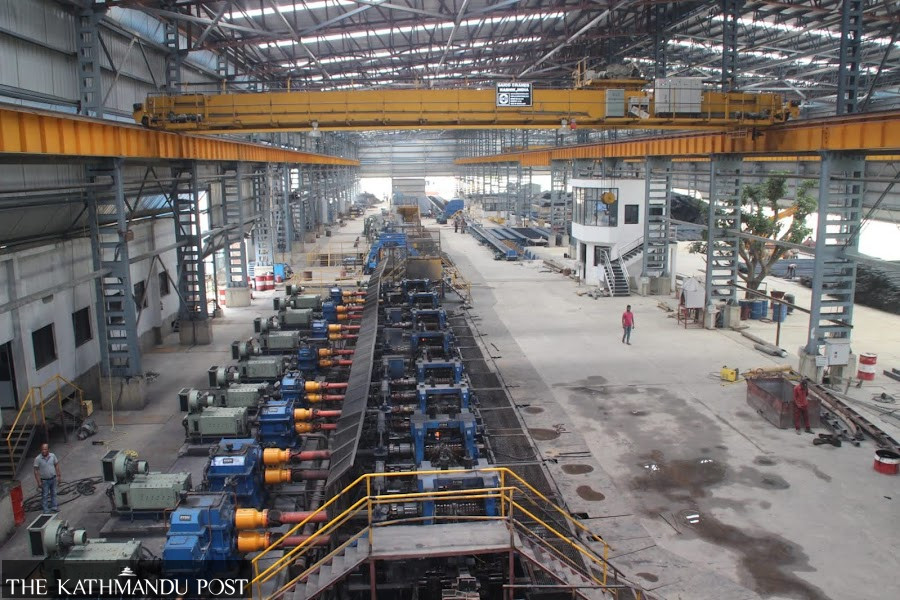Money
Metal manufacturers importing sponge iron instead of billets
The government abolished the customs duty on the import of sponge iron after power generation swelled in a bid to encourage domestic consumption of electricity.
Madhav Dhungana
Most Nepali manufacturers who have been making iron rods using iron billets imported from India have switched to importing sponge iron after the government removed customs duty on the raw material.
The mills producing thermo-mechanically treated (TMT) rods, used in the construction industry to reinforce concrete, say it is cheaper to import sponge iron and make billets in the country than importing them.
Insiders say the import of iron billets from India can be eliminated by producing them in the country to make rebars.
The government abolished the customs duty on the import of sponge iron after power generation swelled in a bid to encourage domestic consumption of electricity. The iron and steel industry requires massive amounts of energy.
Manufacturers plan to import sponge iron to produce billets and TMT rods, and many factories have started to expand their capacity by increasing investment to take advantage of the government policy. The iron and steel industry aims to make Nepal self-sufficient in iron billets in a year.
Insiders say that after Nepal starts producing iron billets, imports from India will be completely stopped, resulting in savings of Rs18 billion annually. The industry will consume Rs10 billion worth of electricity annually and create 10,000 jobs.
Rajesh Agrawal, proprietor of Shree Steels and managing director of Siddhartha Industrial Group, said that producing iron billets requires a tremendous amount of electricity, and the increased power production in the country has made it possible to make them in the country.
"The government policy is also conducive with the availability of electricity," he said. "If this trend continues, Nepal will become self-sufficient in iron billets within a year," he added.
Agrawal said that within the next two months, Shree Steels will be upgraded at a cost of Rs1.25 billion to enable it to produce 150,000 tonnes of iron billets annually.
Currently, there are 27 factories producing TMT iron rods in Nepal. Last year, the country's requirement of TMT rods came to 1.4 to 1.5 million tonnes.
According to the Department of Customs, Nepal imported 1.17 million tonnes of iron billets worth Rs71.36 billion in the last fiscal year 2020-21. The country produced around 400,000 tonnes of iron rods using iron billets and scrap iron. It does not import TMT rods from India.
The government introduced a replacement bill on September 10 waiving customs duty on the import of sponge iron to produce iron billets in the country to encourage the establishment of factories that consume a lot of electricity following an increase in power generation.
The government charges 5 percent duty on the import of iron billets. The government used to levy a 5 percent customs duty on the import of sponge iron.
Sponge iron is made by extracting iron ore from mines and processing it. Sponge iron is processed into iron billets which is used to make TMT rods and other construction materials of iron.
According to traders, importing iron billets costs $600 per tonne and importing sponge iron costs $400 per tonne. The country will save Rs18 billion annually by importing sponge iron instead of billets. Nepal bought 1.17 million tonnes of iron billets from India last year.
The iron and steel industry has also urged the government to bring the country's iron mines into operation immediately. Insiders say that mining iron ore will allow the country to produce sponge iron, and imports of iron can be completely stopped.
"The government should not delay in bringing the existing iron mines into operation," said Bishnu Neupane, president of the Nepal Steel Billet Association and chairman of Saurabh Group, an industrial conglomerate.
According to the association, the import of iron billets from India has been declining in recent times, and the import of sponge iron has been increasing. Iron rod factories that make billets from sponge iron have started supplying iron billets to other factories that do not produce them.
The plants that have started producing iron billets are Pashupati Iron & Steel, Biratnagar; Swastik Steel, Biratnagar; Jagdamba Steels, Birgunj; Sarvottam Steel, Birgunj; Laxmi Steel, Nawalparasi; Narayani Steel, Birgunj; Ambe Steel, Rupandehi; High Tech Steel, Rupandehi; and Ashok Steel, Bara. These factories have the capacity to produce 1.48 million tonnes of billets annually.
Agrawal said that the government should move towards providing iron ore to rod manufacturers by operating the iron mine in Dhawadi, Nawalparasi. "The iron ore deposits in Dhawadi will last at least 50 years," Neupane claimed.
In the last fiscal year, 30,321 tonnes of sponge iron worth Rs1.31 billion and 930,265 tonnes of iron billets worth Rs57.40 billion entered Nepal through Bhairahawa Customs.
As of mid-December of the current fiscal year, 14,131 tonnes of sponge iron worth Rs791.1 million and 221,246 tonnes of billets worth Rs15.54 billion had been imported.




 9.7°C Kathmandu
9.7°C Kathmandu















